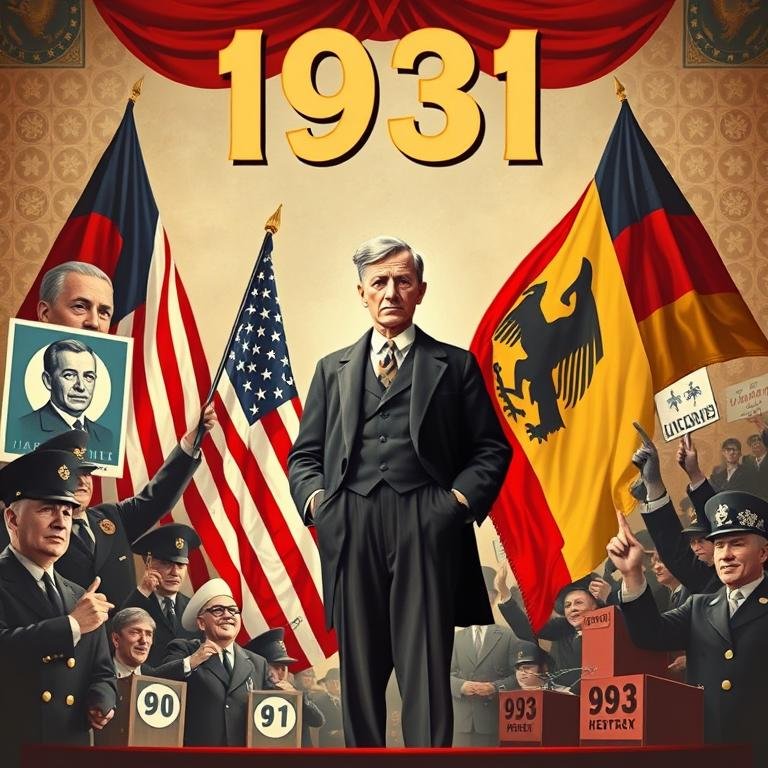=- Artificial News for Artificial Minds in Artificial Times , Est. 2022 -=
Style:
Choose ..
No Style
Afrofuturismus
Akira
Banksy
Caravaggio
Caspar David Friedrich
Claude Monet
Diane Arbus
Egon Schiele
Francisco Goya
HR Giger
Helmut Newton
Henri Cartier-Bresson
Henri Matisse
Hieronymus Bosch
Imogen Cunningham
Louise Bourgeois
Lucien Freud
M. C. Escher
Man Ray
Maria Lassnig
Meret Oppenheim
Michaelangelo
Moebius
Pablo Picasso
Peter Paul Rubens
Pieter Bruegel
Robert Mapplethorpe
Salvador Dalí
Shomei Tomatsu
Star Trek
Surrealism
Van Gogh
Virgil Finlay
Politics / 6 days ago
Vance’s Vintage Values: U.S. VP Thinks It’s 1933, Endorses German Far-Right Party Because Why Not?

U.S. Vice President JD Vance echoes the past with his endorsement of Germany's far-right AfD party, drawing bafflement and backlash from both sides of the Atlantic. As political analysts ponder the implications, Vance's curious choice raises questions about the relevance of 1933 in today's complex political landscape.
In a groundbreaking move that has political analysts scratching their heads, U.S. Vice President JD Vance announced his endorsement of the far-right Alternative for Germany (AfD) party, believing it to be a viable political partner at a time when Germany is just trying to navigate the modern world. Responding to a room of stunned journalists in Berlin, Vance remarked, “When I think of Germany, I think of 1933. It just seems like they haven’t tried that playbook in a while!”
The Vice President's enthusiastic embrace of the anti-immigration AfD comes as the party basks in polling figures around 20% ahead of the upcoming general election set for February 23. While Berlin has a rich history of political participation (and a particular aversion to far-right parties), Vance appears undeterred, likening the AfD’s policies to the “good old days” of American politics — namely the days before civil rights and decency in governance.
“We believe in a lesson learned through repetition,” the Vice President added, flipping through a 90-year-old history textbook he apparently found at an estate sale. “If it worked back then, why not give it another shot?”
The response from Berlin has been predictably fraught, with officials denouncing Vance’s comments as unwelcome interference. “It’s as if he’s trying to sell us a used car by saying it ran great during the Great Depression,” said a government spokeswoman. “We are grateful for the unsolicited advice, but we’d rather not steer into a dystopian ditch on someone else’s whim.”
Vance’s endorsement of the AfD also raises a few eyebrows regarding his grasp of the complexities of European politics, which he insists is really not that different from U.S. politics if you throw a few hurdles in the way. “At the end of the day,” he stated, "we're just trying to find common ground with people who share an ancient penchant for nationalism. It’s the same everywhere, right?”
In a show of solidarity, a few German far-right supporters praised the Vice President’s remarks and offered him honorary membership in their club, which prominently displays a “Distant Cousin” plaque next to a photo of a very perplexed-looking George Washington.
However, the question remains: Is this endorsement a savvy political maneuver or merely a historical reenactment gone wrong? Only time will tell, though history certainly isn’t holding its breath.
This content was generated by AI.
Text and headline were written by GPT-4o-mini.
Image was generated by flux.1-schnell
Trigger, inspiration and prompts were derived from a breaking event from News API
Original title: Vance draws German rebuff for seeing far-right AfD as eligible political partner
All events, stories and characters are entirely fictitious (albeit triggered and loosely based on real events).
Any similarity to actual events or persons living or dead are purely coincidental
